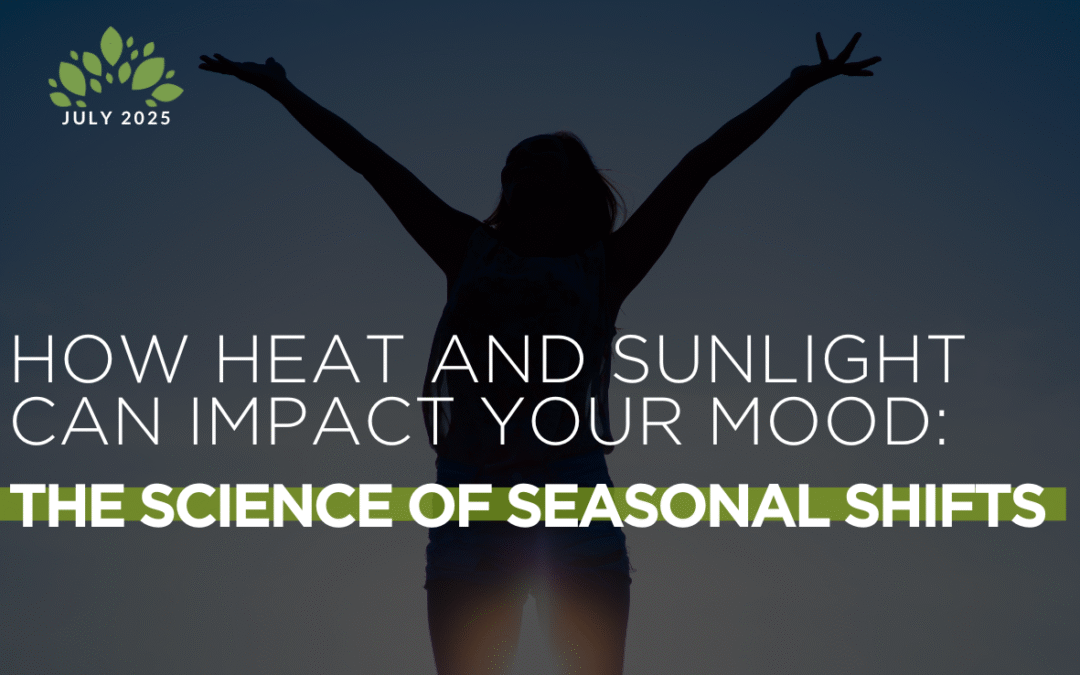How Weather Affects Everyone
Many of us feel a little different depending on the time of year. Some people come alive in the summer sunshine while others feel drained and tired. You may have noticed yourself feeling happier when the sun is out while still at times feeling more irritated when the days are especially hot. These changes in mood are not just in your head, they’re linked to how your body and brain respond to heat, light, and changing seasons.
Understanding how weather affects our emotions is important for everyone, but especially for parents. Children and teens are often more sensitive to environmental changes than adults. Their moods, energy, sleep, and even behavior can shift with the seasons. Unfortunately, many families don’t realize that things like too much heat or too much sunlight can actually impact mental health. When kids act out or seem tired, it might not be just attitude or laziness – it could be their body reacting to the environment around them.
This article is designed to help adults and parents recognize the emotional effects of sunlight and heat. By learning what’s going on inside our bodies, we can better support ourselves and our children.
Sunlight and Your Brain
Sunlight plays a big role in how we feel day to day. When sunlight reaches your eyes, it sends a message to a small part of your brain called the pineal gland. This gland helps control your body’s sleep-wake cycle and daily rhythm. It tells your brain when it’s time to wake up, stay alert, or start winding down. If this rhythm gets thrown off, like during long summer days or late sunsets, it can affect your energy, sleep, and emotions.
Sunlight also helps your body make a natural chemical called serotonin. Serotonin is important because it helps you feel calm, focused, and happy. That’s why people tend to feel better and more positive when they spend time in the sun. A little sunshine each day can improve your mood and even help you sleep better at night.
However, too much sunlight or not getting enough can also be a problem. In the summer, longer days can make it hard to fall asleep on time, especially for kids and teens who may already have late bedtimes. Too much light in the evening can confuse the brain and reduce the melatonin your body needs to feel sleepy. On the flip side, regular sun exposure in the morning helps keep your body in balance, improves focus, and boosts energy during the day.
So while sunlight can make us feel good, it’s important to get just the right amount. This is true not only for adults, but also for children and teens, who are still learning how to manage their own energy and emotions.
The Role of Heat and Temperature
Hot weather can have a strong effect on how we feel, physically and emotionally. When temperatures rise, your body has to work harder to stay cool. This can lead to physical exhaustion and affect how your brain functions. High heat can cause you to feel tired, uncomfortable, and sometimes frustrated or short-tempered.
For children and teens, heat may lead to behavior changes like irritability, lack of motivation, or trouble concentrating. They may seem moody or more emotional than usual and it’s not always clear why. In some cases, heat can also make it harder to sleep at night which then leads to more tiredness and mood problems the next day.
But the heat isn’t all bad. Warm weather often encourages people to go outside, move around more, and spend time with others. This social activity and physical movement are great for mental health. Swimming, hiking, or playing sports outdoors can lift spirits and give a healthy outlet for energy and stress. For many families, summer provides a break from school routines and offers chances to relax, travel, or reconnect.
The key is balance. When heat is moderate and managed well, it can boost well-being. When it gets too extreme or lasts too long, it can wear people down. Paying attention to how heat affects your body and mind can help you adjust and stay healthy through the warmer months.
Summer Blues: Understanding Seasonal Mood Changes
Most people have heard of seasonal depression or “winter blues,” which happens when there’s less sunlight during colder months. But fewer people realize that the opposite can also happen. Some individuals, including kids and teens, can experience sadness, anxiety, or emotional discomfort during summer. This is sometimes called summer Seasonal Affective Disorder (SAD).
Summer SAD can show up in different ways. Some people feel restless or anxious instead of relaxed. They might have trouble sleeping because of the longer days or feel overwhelmed by the constant heat. Others may lose their appetite, feel lonely during school breaks, or get stressed by changes in routine.
At the same time, many people feel their best during summer. More sunlight can mean more energy and improved mood. Breaks from school and work can provide a chance to slow down and spend time with family or pursue hobbies. Being outdoors, especially in nature, is linked to lower stress and better mental focus.
For parents, it’s important to know that every child responds differently. One child may thrive in summer while another struggles. Knowing what to look for and how to respond can make a big difference in how your child experiences seasonal change.
How to Stay Mentally Balanced in Hot Weather
Taking care of your mental health during hot and sunny months doesn’t have to be complicated. Here are simple and helpful ways to stay balanced:
- Drink water often throughout the day to stay hydrated. Even mild dehydration can affect your mood and energy.
- Try to keep a regular sleep schedule. Go to bed and wake up at the same time every day, even during summer break.
- Spend time outdoors in the morning or late afternoon when it’s cooler. Avoid too much direct sun during the hottest parts of the day.
- Use fans or air conditioning when indoors. If you don’t have access, visit a public place like a library or shopping center to cool down.
- Eat regular meals and snacks. Heat can sometimes reduce your appetite, but your body still needs fuel to stay focused and calm.
- Take breaks from screens and spend time doing relaxing activities like reading, drawing, listening to music, or talking with friends and family.
- Pay attention to how your kids are feeling. If they seem more tired, moody, or overwhelmed than usual, gently ask what’s going on and offer support.
These small habits can make a big difference, especially over time. They help keep your brain and body in balance during warm months.
When to Ask for Help
Everyone has days when they feel low, tired, or stressed – especially in extreme weather. But if your mood or your child’s mood is changing in a big way and it lasts for more than a couple of weeks it might be time to reach out for help.
Here are some signs to look for:
- Feeling down or sad most of the time
- Not enjoying activities that used to be fun
- Big changes in sleep or eating habits
- Trouble getting through the day or focusing on tasks
- Withdrawing from family or friends
- Talking about feeling hopeless or worthless
If you notice these changes in yourself or your child, talking to a mental health professional can be a helpful next step. Support is available and the sooner you reach out the easier it can be to start feeling better.
Let Aspire Counseling Services Support You
At Aspire Counseling Services, we understand how weather and seasonal shifts can impact emotional health for people of all ages. Whether you’re an adult managing stress, or a parent noticing changes in your teen, our trained therapists are here to help.
We offer personalized support through individual, family, and group counseling—both in person and online. We work with you to understand what you’re going through and build strategies that support mental and emotional well-being.
If you or your child are feeling overwhelmed by the heat, changes in routine, or any seasonal challenges, don’t wait to ask for help.
You don’t have to go through it alone. Let’s work together to help you and your family feel your best, no matter the season.

